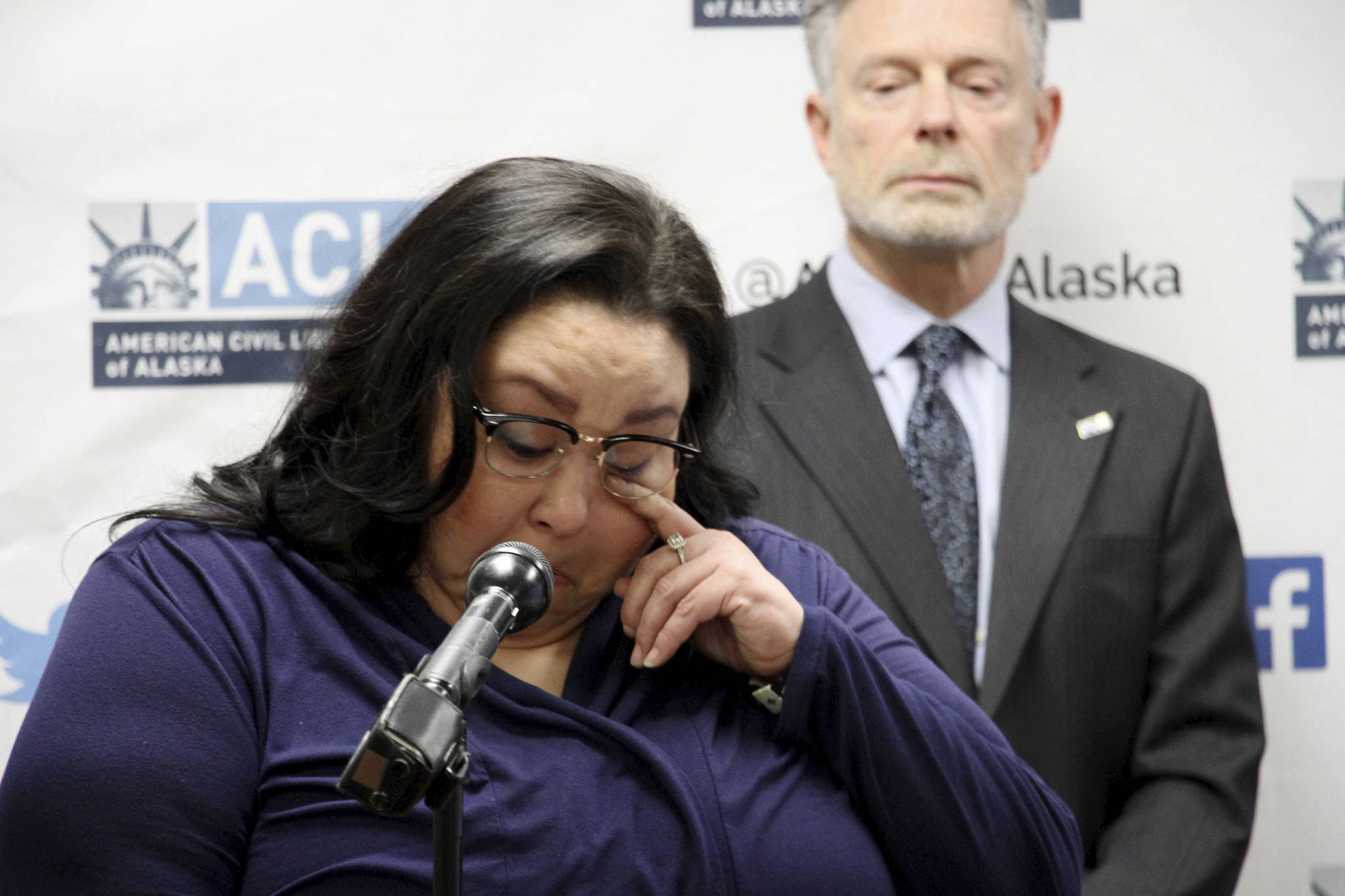ANCHORAGE — A former police dispatcher in a small Alaska town filed a lawsuit Thursday, alleging her colleagues in the Nome Police Department didn’t investigate after she filed a rape report.
Clarice Hardy’s lawsuit claims the inaction was “part of the city’s systemic and ongoing failure to protect Alaska Native woman from sexual abuse and assault.”
The Associated Press does not normally name alleged victims of sexual assault but Hardy has repeatedly spoken in public about her experience.
The lawsuit filed in federal court on behalf of Hardy by the ACLU seeks unspecified monetary damages and a jury trial in Nome. It came after complaints by Alaska Native women were investigated by The Associated Press, the Anchorage Daily News and other media outlets.
The six counts in the lawsuit includes a violation of the Equal Protection Clause of the 14th Amendment to the U.S. Constitution.
[Governor says the state is at a crossroads]
Last year, the ACLU sent a demand letter, seeking $500,000 on Hardy’s behalf if the city was willing to settle out of court.
“Those claims were essentially ignored, much like Miss Hardy’s have, and the city refused to negotiate with us,” Stephen Koteff, ACLU’s legal director in Alaska, told reporters.
The lawsuit also seeks an injunction to force the City of Nome to cease any discriminatory practices and ensure all sexual assault reports are investigated thoroughly. It also seeks punitive damages from the city and separately from two former police officers.
Hardy said she no longer felt safe in Nome and moved to her home village, Shaktoolik, where she said girls and men tell her similar stories of abuse.
“It reminds me that no matter how bad my trauma is, or how real my depression, is that I have a voice for a reason,” she said, holding back tears. “I can’t undo the harm done to the hundreds of women the Nome Police Department failed to help, but maybe I can stop this from happening again. Maybe that’s my purpose.”
Nome’s own police data showed between 2008 and 2017, only 8% of calls about sexual assaults against adults resulted in arrests with charges filed in the city of about 4,000 residents located on the Bering Sea coast.
Nome City Manager Glenn Steckmann, who has been on the job since November, told the AP he hadn’t seen the lawsuit, and wouldn’t be able to comment on pending litigation anyway.
Besides the city, two former officers, Lt. Nicholas Harvey and Chief John Papasodroa, were also named as defendants. Both no longer work for the police department.
The lawsuit claims Papasodroa “was aware of these failures and ratified his staff’s persistent practice of inadequately responding to sexual assault reports and allowed it to continue.”
An audit by Papasodora’s successor, Robert Estes, found that 76 of the 182 sexual assault reports made between 2015 to 2018 were inadequately investigated. The lawsuit claimed Harvey was responsible for many of those faulty investigations.
“In some of those cases, Lt. Harvey conducted no investigation at all,” the lawsuit said.
Phone message and email messages to Harvey seeking comment were not returned. Efforts to find phone contact information for Papasodora were unsuccessful.
Estes quit in October 2019, a day after the Nome City Council rejected his request for more resources to investigate cases.
Hardy, of Inupiaq heritage, was a 911 dispatcher for Nome police from 2015 to 2018.
In March 2017, she awoke one morning, sore and bruised, with no memory of getting home the night before. Friends called her, she said, telling her about photos and a video posted on Snapchat that seemed to show a man having sex with her while she was unconscious.
Hardy told Harvey she believed she’d been drugged at a local bar and then sexually assaulted. She said she gave him a list of witnesses but they later told her no one from the police department contacted them. Meanwhile she took calls from others who were seeking updates on their sexual assault reports from Harvey.
“Just tell her I’m working on it,” was his response, Hardy previously told the AP.
It was the same thing he told her every time she asked about her own case, Hardy said.
“That’s when it sparked,” she said. “Oh my God, he’s not doing anything.”
[Advocacy groups and lawmakers push for Red Flag laws]
She told Papasodora, and she said he said he could not find a report. He asked her to fill out another report and said he would give it to the Alaska State Troopers so they could investigate.
Two months later, Hardy said she asked him the status of the report.
“Chief Papasodora told Ms. Hardy that he ‘had been meaning to get to it,’ but that he had not yet taken any action,” the lawsuit said.
“Before I was raped and before I learned the truth about the Nome Police Department, I considered my colleagues family,” she told reporters. “So that’s who I turn turned to after I was raped. They told me that they’d help me. They didn’t.”
Hardy added: “Instead, they lied to me over and over and over again.”
• This is an Associated Press report by Mark Thiessen.

